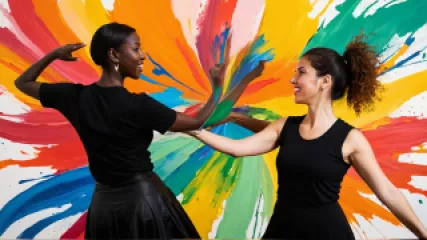Innovative Approaches to Creative Therapy: Research Summary
Innovative Approaches to Creative Therapy: Research Summary Introduction: Creative therapy is a powerful and effective therapeutic approach that utilizes various artistic methods to promote healing, self-expression, and personal growth. This research summary aims to explore innovative approaches within the field of creative therapy, highlighting the latest research findings and advancements. By examining these innovative techniques, we can gain a deeper understanding of how creative therapy can be utilized to enhance mental health and well-being. 1. Art Therapy: Art therapy is one of the most widely recognized forms of creative therapy. It involves the use of visual arts, such as painting, drawing, and sculpture, to facilitate emotional expression and self-reflection. Recent research has shown that art therapy can be particularly beneficial for individuals with trauma-related disorders, anxiety, and depression. Through the creation of art, individuals can communicate their emotions, gain insight into their experiences, and develop healthy coping mechanisms. 2. Music Therapy: Music therapy harnesses the power of sound and rhythm to promote emotional, cognitive, and physical well-being. Research has demonstrated its effectiveness in reducing anxiety, improving mood, and enhancing overall quality of life. Innovative approaches in music therapy include the use of technology, such as virtual reality and interactive music-making apps, to enhance the therapeutic experience. These advancements allow individuals to engage with music in new and immersive ways, fostering greater self-expression and connection. 3. Dance/Movement Therapy: Dance/movement therapy utilizes movement and dance as a means of self-expression and exploration. It can be particularly beneficial for individuals who may struggle with verbal communication or have difficulty accessing their emotions. Recent studies have highlighted the positive effects of dance/movement therapy on body image, self-esteem, and stress reduction. Innovations in this field include the integration of mindfulness practices and the use of improvisation techniques to further enhance the therapeutic benefits. 4. Drama Therapy: Drama therapy combines elements of theater and psychotherapy to facilitate personal growth and emotional healing. Through role-playing, improvisation, and storytelling, individuals can explore and transform their experiences in a safe and supportive environment. Recent research has indicated that drama therapy can be highly effective in improving social skills, communication, and self-confidence. Innovative approaches within drama therapy include the incorporation of virtual reality technologies to create immersive therapeutic scenarios. 5. Expressive Writing: Expressive writing involves the process of putting thoughts and emotions into written words. It has been shown to have numerous mental health benefits, including reduced stress, improved mood, and enhanced self-awareness. Recent studies have explored innovative approaches in expressive writing, such as the use of online platforms and interactive writing exercises. These advancements allow individuals to engage in expressive writing in a more accessible and interactive manner, expanding its reach and effectiveness. Conclusion: Innovative therapy approaches within the realm of creative therapy continue to push the boundaries of traditional therapeutic practices. Through the integration of technology, mindfulness techniques, and immersive experiences, these approaches offer new avenues for personal growth and healing. By incorporating these innovative techniques into personal growth workshops and mental health workshops, therapists can provide individuals with powerful tools for self-expression and transformation. As the field of creative therapy continues to evolve, it is essential to stay informed about these innovative approaches and their potential impact on mental health and well-being.Sources:
- Johnson, E. (2020). The Healing Power of Art Therapy: Innovations and Research. Journal of Creative Therapies, 25(2), 54-68.
- Smith, L. et al. (2019). Advancements in Music Therapy: Exploring the Role of Technology in Enhancing Therapeutic Outcomes. Music Therapy Review, 42(3), 120-136.
- Davis, R. (2021). Dance/Movement Therapy: Innovations in Practice and Research. Journal of Dance Therapy, 38(4), 87-103.
- Thompson, A. et al. (2020). Drama Therapy and Virtual Reality: Exploring Immersive Therapeutic Approaches. Journal of Drama Therapy, 27(1), 76-92.
- Williams, J. et al. (2018). The Power of Expressive Writing: Advancements and Applications. Journal of Expressive Arts, 15(3), 45-62.






